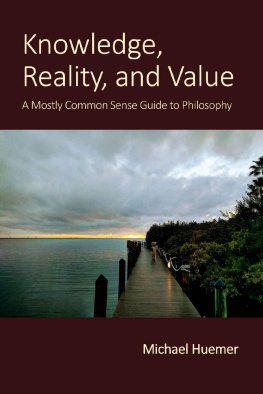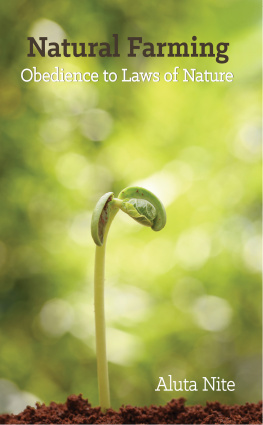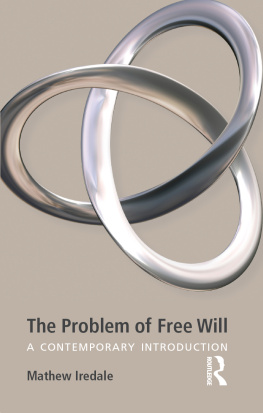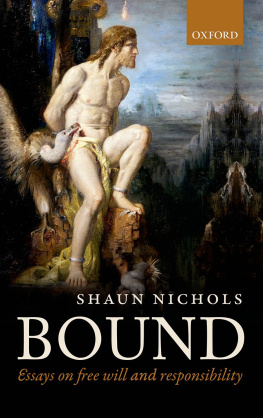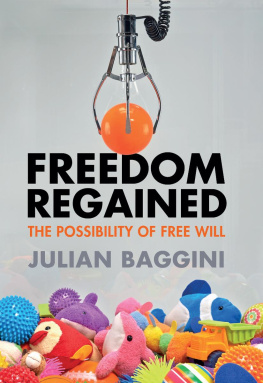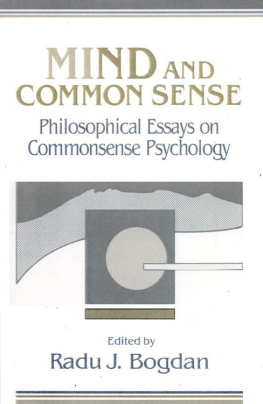Causes, Laws, and Free Will:
Why Determinism Doesn't Matter
Kadri Vihvelin
(p.iv) 
- Oxford University Press is a department of the University of Oxford.
- It furthers the Universitys objective of excellence in research, scholarship,
- and education by publishing worldwide.
- Oxford New York
- Auckland Cape Town Dar es Salaam Hong Kong Karachi
- Kuala Lumpur Madrid Melbourne Mexico City Nairobi
- New Delhi Shanghai Taipei Toronto
- With offices in
- Argentina Austria Brazil Chile Czech Republic France Greece
- Guatemala Hungary Italy Japan Poland Portugal Singapore
- South Korea Switzerland Thailand Turkey Ukraine Vietnam
- Oxford is a registered trademark of Oxford University Press in
- the UK and certain other countries.
- Published in the United States of America by
- Oxford University Press
- 198 Madison Avenue, New York, NY 10016
- Oxford University Press 2013
- All rights reserved. No part of this publication may be reproduced, stored in a
- retrieval system, or transmitted, in any form or by any means, without the prior
- permission in writing of Oxford University Press, or as expressly permitted by law,
- by license, or under terms agreed with the appropriate reproduction rights organization.
- Inquiries concerning reproduction outside the scope of the above should be sent to the
- Rights Department, Oxford University Press, at the address above.
- You must not circulate this work in any other form
- and you must impose this same condition on any acquirer.
- Library of Congress Cataloging-in-Publication Data
- Vihvelin, Kadri.
- Causes, laws, and free will : why determinism doesnt matter / Kadri Vihvelin.
- p. cm.
- Includes bibliographical references and index.
- ISBN 9780199795185 (alk. paper)ISBN 9780199795253 (updf)
- 1. Free will and determinism. 2. Agent (Philosophy) 3. Act (Philosophy)
- 4. Choice (Psychology) I. Title.
- BJ1461.V615 2013
- 123.5dc23
- 2012033749
Dedication
(p.v) For my mother, Lia Marandi
and in memory of my father, Hugo Vihvelin (p.vi)
(p.ix) Acknowledgments
Many people helped me in various ways during the writing of this book. I am particularly grateful to my husband and fellow philosopher Terrance Tomkow and to my colleague and friend Janet Levin. Keith Hall read the entire manuscript with a wonderfully keen and perceptive eye and helped me improve it in countless ways. I am also grateful to Maria Alvarez, Ara Astourian, Randolph Clarke, John Martin Fischer, Charles Hermes, Matt Lutz, Alfred Mele, Dana Nelkin, Kenneth Pearce, Abelard Podgorski, Kenneth Silver, Aaron Veek, Aness Webster, Adina Roskies, and Gary Watson for reading parts of the manuscript and providing valuable comments.
For comments on earlier work that formed the basis for this book, there is a much longer list of people to thank and Im sure I have forgotten some. Thanks to: Jonathan Bennett, Mark Bernstein, Brian Blackwell, Michael Bratman, Bob Bright, Curtis Brown, Joe Campbell, John Carroll, Ewing Chinn, Doug Ehring, Nathan Gadd, Ish Haji, Mark Heller, Hud Hudson, Frances Howard-Snyder, Robert Kane, Tomis Kapitan, Barry Loewer, Steve Luper, Ned Markosian, Michael McKenna, Adam Morton, Rebekah Rice, Jonathan Schaffer, Ted Sider, Justin Snedegar, Dan Speak, Julia Staffel, Brian Talbot, Jason Turner, Manuel Vargas, Peter van Inwagen, David Widerker, George Wilson, Gideon Yaffe, and Sherri Zhu.
Papers that were ancestors of parts of this book were delivered to philosophical audiences at Stanford, North Carolina State, University of Victoria, the Bellingham Summer Philosophy Conference, the Inland Northwest Philosophy Conference, various meetings of the American Philosophical Association, the First Online Philosophy Conference, and the Garden of Forking Paths blog. Thanks to all who participated.
Im grateful to the University of Southern California, which has always given me the freedom to teach more or less whatever I want, to students at every level. There is much talk these days of experimental philosophy, but I know of no better experiment than teaching and listening carefully to your students (or paying attention to their incredulous stares). I have learned a great deal by coming to understand what they found puzzling, what they thought obviously true, and also the points on which they disagreed with one other. I am also grateful for the university-funded course and sabbatical leaves, which gave me valuable additional time to write.
This book has taken unfashionably, unspeakably, many years to write. My original plan, to take a break from thinking about causation and counterfactuals by writing a (p.x) book on what I thought was the easier topic of free will, was interrupted, in the best possible way, by the early arrival of my sons, Alexander and Nikolai. Three years later I began again, but was then diverted by another project, Our Doings and What We Allow, for which I was fortunate enough to get NEH funding. Then that project stalled, so I went back to the free will book, which also turned out be more difficult than I had realized. But the roundabout route made sense in the end, for the book turned into a long argument for the claim that the key to the solution to the free will/determinism problem lies in a better understanding of causation, dispositions, and counterfactuals. I am grateful to have been part of the generation of philosophers with the privilege of working at this leisurely pace.
I am grateful to Peter Ohlin, of Oxford University Press, for his unwavering faith that I would actually finish writing this book and for his advice and encouragement over the years. And I am grateful to Emily Sacharin for her patience and valuable editorial assistance during the final stages of getting the book to press.
Portions of this book derive from some of my previously published articles.
Chapter Two draws on some material first developed in Compatibilism, Incompatibilism, and Impossibilism, Contemporary Debates in Metaphysics, ed. T. Sider, J. Hawthorne, and D. Zimmerman (Blackwell, 2008) and in How to Think about the Free Will/Determinism Problem, Carving Nature at its Joints, ed. J. Campbell, M. ORourke, and M. Slater (MIT Press, 2011). Chapter Four incorporates material from Freedom, Foreknowledge, and the Principle of Alternate Possibilities and Foreknowledge, Frankfurt, and Ability to Do Otherwise: A Reply to Fischer, both published by The Canadian Journal of Philosophy (2000 and 2008). Sections 1, 5, and parts of section 6 of Chapter Five are based on sections of Arguments for Incompatibilism, Stanford Encyclopedia of Philosophy(2003, revised 2011). Parts of Chapter Six derive from material first presented in Free Will Demystified: A Dispositional Account,


